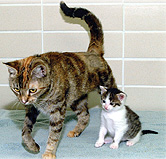
MONDAY, Aug. 9 (HealthDay News) — Dry pet food may be a little-known source of Salmonella bacterial infection among humans, and young children seem to be especially at risk, a new study finds.
The authors of the study say they tracked a 2006-2008 Salmonella outbreak that sickened 79 American patients — about half of them 2 years old or younger — to household use of dry cat and dog food.
“It’s a tough thing because pets are not symptomatic like we are and can shed this [bacterium] for up to 10 to 12 weeks” in their feces, said Dr. Peter Richel, chief of pediatrics at Northern Westchester Hospital in Mt. Kisco, N.Y., who is familiar with the findings. “It is a little disconcerting to hear that otherwise benign-appearing pet food can pose any risk at all.”
The issue has made headlines in recent days with several varieties of Iams and Eukanuba dog and cat food recalled last week due to potential Salmonella contamination. The manufacturer, Procter & Gamble, says no cases of human Salmonella have yet been linked to these products.
The proportion of people who fell ill from contaminated pet food in the 21-state outbreak covered by the new study was small, but the fact that the food-borne illness affected young children so drastically is troubling, experts said.
Salmonella, a food-borne illness, can be serious in infants and the elderly.
Reporting in the September issue of Pediatrics, researchers led by Dr. Casey Barton Behravesh of the U.S. Centers for Disease Control and Prevention say that contact with pets and contact with the pet’s environment — their bed and where they eat and sleep, for example — can result in human infections.
Feeding pets in the kitchen quadrupled the risk of illness, although “the reasons for that are a little unclear,” said Dr. Timothy Pfanner, assistant professor of internal medicine at Texas A&M Health Science Center College of Medicine and a gastroenterologist with Scott & White Healthcare in Temple, Texas.
“It looks like the bacteria multiply either on the floor of the kitchen, or I suspect people don’t clean their dog bowls,” said Pfanner, who was not involved in the study.
On the other hand, the researchers found that children who actually put pet food into their mouth seemed to have no added risk.
The Pennsylvania plant where the contaminated pet food was manufactured was eventually closed, the researchers note. However, they add that since 2006, at least 135 pet products, including pet supplements and pigs’ ears, have been recalled as a result of Salmonella contamination.
This new study, “re-emphasizes the importance of washing your hands whenever you deal with anything from a pet, including petting him, touching his mouth or cleaning up after him, especially for children whose immune systems are very weak in comparison to adults,” said Dr. Philip Tierno, clinical professor of microbiology and pathology at New York University Langone Medical Center in New York City and author of The Secret Life of Germs.
“Hand washing is the single most important thing anyone can do to protect their health, and that’s within everyone’s purview if you teach them,” Tierno said. “You can do that and not be afraid.”
Another precaution is to have well-packaged, well-stored pet food, keeping it out of the reach of infants and toddlers, said Richel.
“This is a small section of total cases of Salmonella, but it’s important because so many of our kids are on the floor all the time,” said Pfanner.
More information
The U.S. Centers for Disease Control and Prevention has more on Salmonella.

